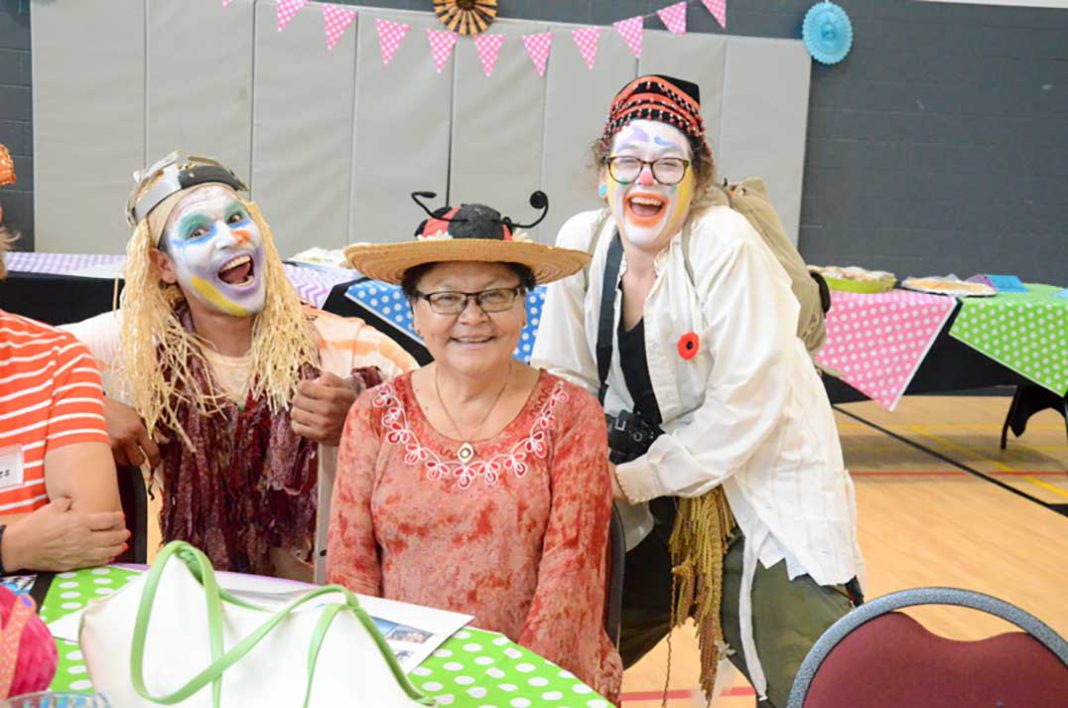AUNDECK OMNI KANING—Humour plays an important role in healing, which might go a long way toward explaining the resilience demonstrated by so many residential school survivors. Humour was a central theme during the Mad Hatter Tea Party for Indian Residential Schools and Families hosted by Noojmowin Teg Traditional Health.
“We are very fortunate to have Barbara Nolan as our guest speaker,” said Mad Hatter Tea Party organizer Janice Trudeau, Noojmowin Teg Health Centre Resolution Health Support worker. Ms. Nolan is herself a residential school survivor and her presentation ‘Personal Forgiveness Journey’ was greeted by plenty of laughter from an audience bedecked in a collection of hilarious ‘mad hats.’
Ms. Nolan’s personal story began in her childhood, when her parents sent her off to residential school to gain an education and to learn English. Education, she noted, was very important in her family. While Anishinaabemowin was the language she was born into, it was generally recognized that “if you wanted to be a nurse, or a teacher, you had to learn English,” she recalled. “I wanted to be a teacher.”
“I have forgiven my parents (for sending her to residential school),” noted Ms. Nolan. “They thought they knew what they were doing.” The more difficult path of forgiveness for her was far more personal—she had to learn to forgive herself.
Ms. Nolan recounted how the negative lessons she learned in residential school on child-rearing impacted on how she had raised her own children. “I would scream at them, that is how they did it at the residential school,” she recalled. Children are very resilient, however, and memories tend to block out the negative of the past. “My children told me ‘oh you weren’t that bad’.”
Most of Ms. Nolan’s presentation was given in Anishinabemowin, leavened with occasional sojourns into English, but so consummate a storyteller is Ms. Nolan that someone with only a nominal grasp of the language could actually follow along with much of what she was imparting.
She spoke of her early years in Toronto and how she came to meet her future husband Tom Nolan of Sagamok—“tall, dark and handsome.” Her husband passed away a year and a half ago.
When she came home to Wiikwemkoong to tell her father that she wanted to get married he had two questions: “Is he Anishinaabe? Is he Catholic?” Although the first answer was yes, the second was more problematic. “He was Anglican,” she recalled. “I was so worried he was going to say no,” she laughed.
Ms. Nolan segued her personal experiences and life story into her own healing journey, and the steps of the grief cycle, recalling an experience where she attended a healing circle. Magaret Pitawankwat assisted The Expositor in interpreting the story. Ms. Nolan recounted how while at university, she went to a grieving workshop in order to learn about the process, not believing she herself had any grief that needed healing. An instructor placed the group in a circle. During the healing circle, a young woman began to cry. The instructor told the others in the circle to close their eyes. Ms. Nolan admitted to her insatiable curiosity and that she peeked. What she witnessed amazed her. The facilitator was washing the young woman and Ms. Nolan could see something cascading from her body as the facilitator cleansed her, but there was nothing on the floor beneath the distressed woman.
Ms. Nolan had entered the healing circle believing that she had no pain that needed remedy, but she discovered that those who have unbearable pain will push those memories deep into their psyche, forgetting that there is pain. But that pain is still there, festering and poisoning the lives of those within whom it lies.
Some survivors of residential school believe the experience was positive, that they enjoyed their time there. “That’s okay,” said Ms. Nolan. “They have that right to believe that.” But that time in the grieving circle had taught her how deep her own pain had been buried and she was able to begin her own journey towards healing.
“My kids had forgiven me, but I had to learn to forgive myself,” she said. “I had to learn to forgive those teachers for what they did to me. Forgiveness is the last step in the grieving cycle.” Forgiveness, she added, does not mean forgetting. “You will never forget.”
Within each of us is a little child, a child that wants to play, that wants to laugh. “You have to let that little child within you come out to play,” said Ms. Nolan.
At this point a pair of clowns from Debajehmujig Storytellers came into the room and began to interact with the residential school survivors and their families. The pair of clowns lightened the atmosphere while they took photographs with the audience.
In the afternoon presentation, Noojmowin Teg child nutritionist Cody Leeson brought insights into the many benefits of the humble blueberry. “Blueberries really are nature’s true superfood,” he said. “There are just so many health benefits contained in these little sweet packages.”
Good nutrition is also an important part of taking care of oneself and laying the foundations of a healing journey.




